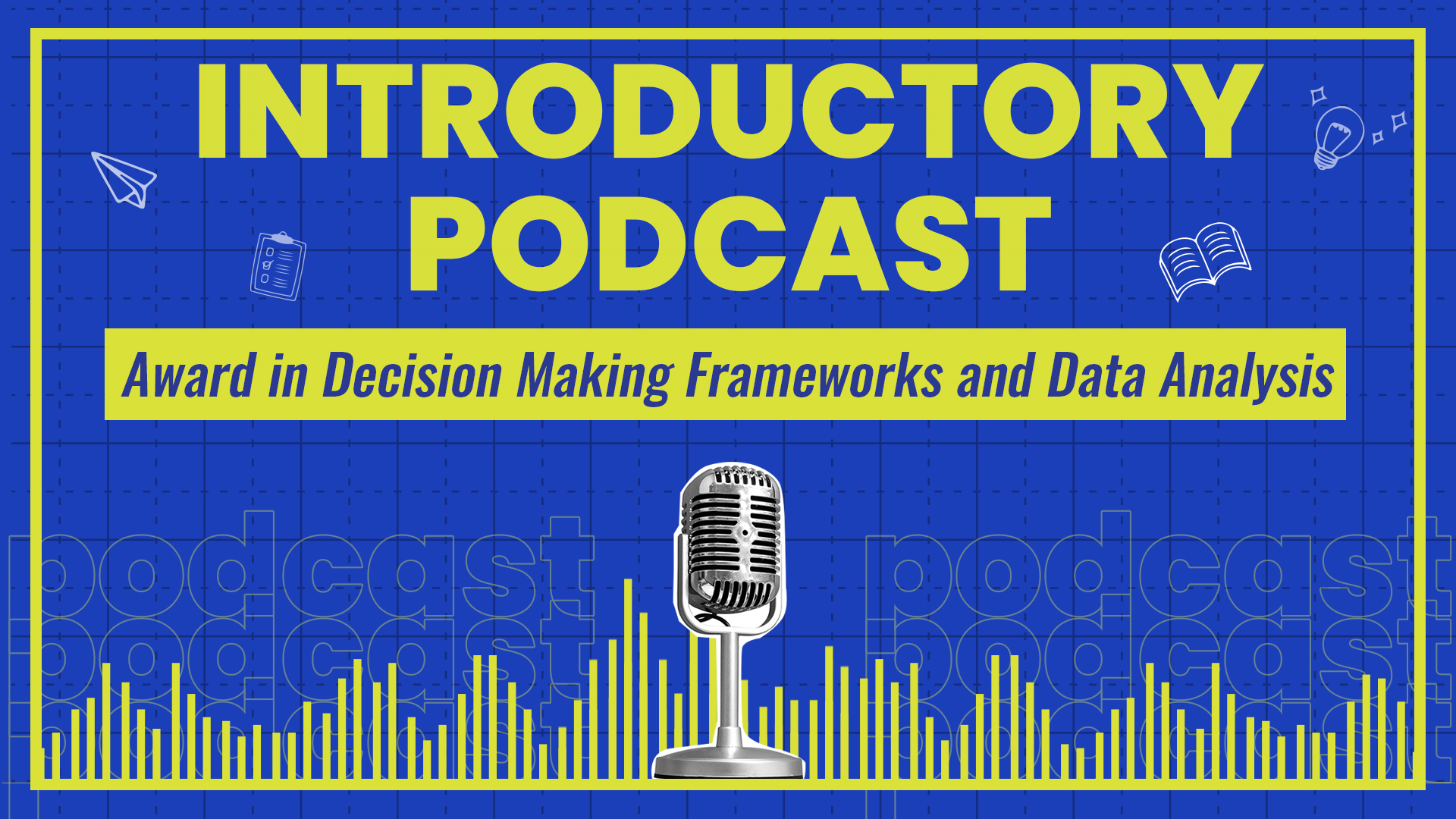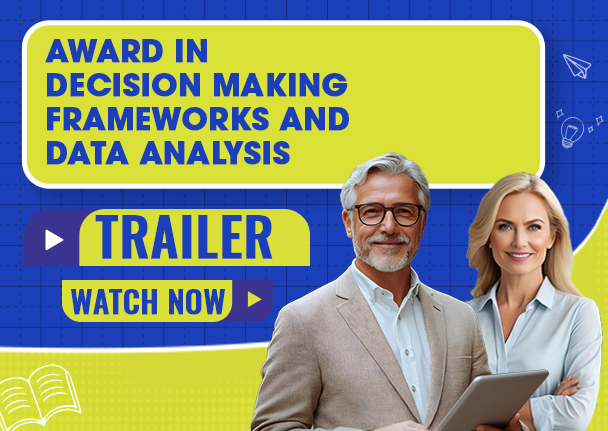Award in Decision Making Frameworks and Data Analysis
The MBA module on Decision Making Frameworks and Data Analysis equips students with the tools and methodologies to make informed, strategic, and ethical decisions in complex business environments.
-
OrientationDirector’s Introduction03:27Orientation10:52Understanding Podcasts01:46Understanding Pre-recorded Lectures02:25Understanding Pre-recorded Interviews01:54Understanding Case Studies01:47Understanding Discussion Boards02:30Ascencia Style SheetAI PolicyPolicy for Online Interaction and Behaviour for E-Academic Students
-
CourseworkIntroductory Podcast06:44Assignment Podcast06:37
-
The Decision Making Process Part 1 - 5Part 1: The Decision-Making Process – Detailed Introduction31:01Part 2: The Decision-Making Process – Detailed Introduction01:13:03
-
The Decision Making Process Part 2 - 5Part 1: Decision-Making Models and Theories01:18:40Part 2: Decision-Making Models and Theories01:11:57
-
The Decision Making Process Part 3 - 5Part 1: Creativity in Decision-Making01:34:44Part 2: Creativity in Decision-Making01:05:55
-
The Decision Making Process Part 4 - 5SWOT, OKR’s and Porter’s 5 Forces for Decision Making51:34
-
The Decision Making Process Part 5 - 5Part 1: Ethical Considerations in Decision-Making49:07Part 2: Ethical Considerations in Decision-Making27:11Part 3: Ethical Considerations in Decision-Making32:20Guest Interview: Josianne / Lawrence Gonzi01:10:32
-
Decision Making Tools and Techniques Part 1 - 5Decision-Making Tools and Techniques01:07:08Lecture 6.1: The Monte Carlo Simulation38:37Journal Article - Monte Carlo SimulationLecture 6.2: Sensitivity Analysis46:02Sensitivity AnalysisLecture 6.3: Part A: Decision Trees43:47Lecture 6.3: Part B: Decision Trees37:45Journal Article - The Art of Building Decision TreesJournal Article - Decision Trees
-
Decision Making Tools and Techniques Part 2 - 5Part 1: Managing Uncertainty in Decision Making01:01:59Part 2: Managing Uncertainty in Decision Making01:20:41Guest Interview: Josianne / Daniel Debono36:35
-
Decision Making Tools and Techniques Part 3 - 5Part 1: Collecting the Right Data: The Foundation of Data-Driven Decision Making00:44:15Part 2: Collecting the Right Data: The Foundation of Data-Driven Decision Making00:52:25Lecture 8.1: Part 1: Data Cleaning and Preprocessing42:53Lecture 8.1: Part 2: Data Cleaning and Preprocessing40:12Lecture 8.2: Part 1: MIS for Collecting, Cleaning and Data Interpretation56:30Lecture 8.2: Part 2: MIS for Collecting, Cleaning and Data Interpretation48:53
-
Decision Making Tools and Techniques Part 4 - 5Optimization Techniques in Decision Making43:59
-
Decision Making Tools and Techniques Part 5 - 5Advanced Quantitative Techniques for Decision-Making36:36Lecture 10.1: Research Frameworks and Decision-Making Models for Data-Driven Strategies00:54:58
-
Decision Making in a Global ContextPart 1: Decision Making in Global and Cross-Cultural Contexts43:22Part 2: Decision Making in Global and Cross-Cultural Contexts37:00
The MBA module on Decision Making Frameworks and Data Analysis equips students with the tools and methodologies to make informed, strategic, and ethical decisions in complex business environments. Leaders need to be able to recognize the soundness of the data underlying information on which decisions need to be made. This module aims to equip students with the necessary tools, traditional and AI-based, and techniques to make effective decisions in complex business environments. They will learn to analyze complex business problems, evaluate options, and make informed decisions based on data-driven insights.
Programme Outcomes
- Students will master the decision-making process, from identifying problems to evaluating and implementing solutions, with a focus on critical thinking and creativity.
- They will learn to navigate uncertainty through risk assessment, scenario planning, and strategic frameworks like SWOT and OKRs.
- The module emphasizes data-driven decision-making by integrating statistical analysis, visualization techniques, and AI tools, while also exploring ethical considerations and team-based decision dynamics.
- By examining global and cross-cultural contexts, students will gain the ability to adapt decision-making strategies to diverse cultural environments, preparing them to lead with confidence and insight in today’s interconnected world.
- A Bachelor's degree or post-graduate degree in business, administration, management, or a related field
- Minimum 180 ECTS previously acquired at a Higher Education institution
- 2 years of work experience
- A GPA score of 2.5 (C+) or higher (or equivalent) will be required
- Proof of C1 level of English or equivalent
Course Syllabus Podcast
Gain a Comprehensive Understanding of the Course Syllabus with Our Informative Podcast.
- Assignment - 100%
- Eportfolio
- You can submit your assessment at any time during the course.
What’s included
-
Duration:Full Time- 3 Months
Part Time- 6 Months - Learning: 125+ Hours
- Blockchain Certificate

